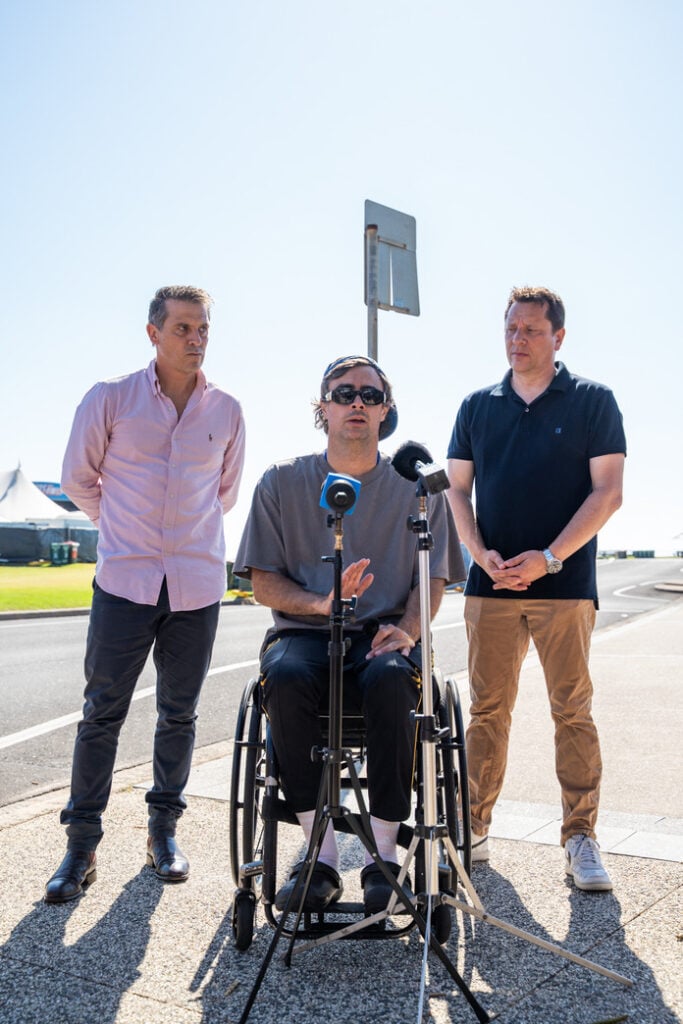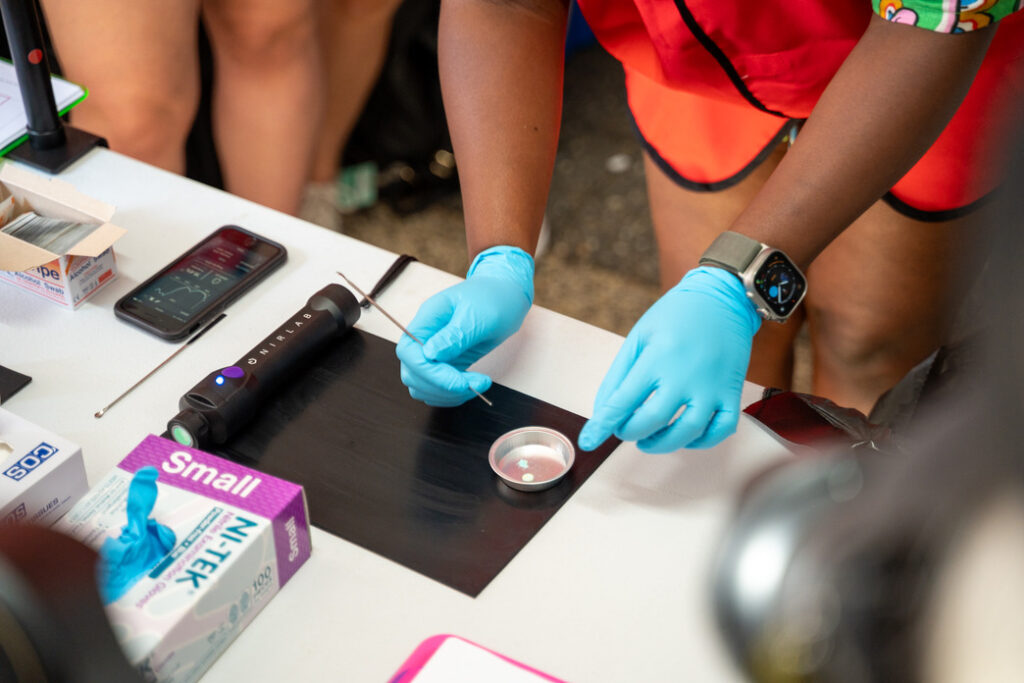Australia stands on the precipice of paradigm change. In December 2024, NSW Premier Chris Minns made a historic announcement: “Drugs are illegal in the state, yet we’ve made a decision to allow for pill testing at major music festivals. The government’s made a decision to live with the contradiction, rather than risk someone dying as a result of not having it.”
In her own announcement, Victorian Premier Jacinta Allan echoed the same: “It doesn’t make pills legal, but it does keep people safe.”
With drug checking services active across half the country, pill testing looks poised to become standard practice at music festivals everywhere. Yet the ideological moralising that has delayed these services and underpinned Australia’s drug war for 40 years is far from over. In April, Queensland’s new Liberal National Health Minister Tim Nicholls scrapped funding for his state’s trial, telling Rolling Stone AU/NZ that “pill testing sends the wrong message.”
“Pill testing sends the wrong message.” Queensland’s Liberal National Health Minister Tim Nicholls
Regardless of whether drug taking is morally acceptable, it is ubiquitous. That reality is why we treat drugs as both a criminal and a health issue. In doing so, we inscribe inherent contradiction in our policy. Pill testing has become its most visible manifestation and the site of intense ideological battle.
As other jurisdictions watch closely, the significance of these trials is certain, but their continuity is not. Either they will build national momentum or they will fall to an ideological inability to sit with the discomfort of the contradiction. Lives will be forever changed by the outcome.
The Day Alex Didn’t Come Home
Love Music?
Get your daily dose of everything happening in Australian/New Zealand music and globally.
“Alex was like any other 19-year-old. Leaving school, starting to navigate life. She had hopes and dreams. She was loving, she was caring, she was funny. All those things you want your children to be,” Jen Ross-King tells Rolling Stone AU/NZ.
A teenager from the suburban Central Coast, Alex Ross-King arrived at FOMO Festival in 2019 to a wall of cops, drug dogs, and the threat of strip search. Rather than risk a criminal record if her MDMA caps were discovered, and potentially miss an upcoming trip to Bali with her friends, Alex swallowed the three she had. It’s a behaviour known as ‘panic ingesting’.
It was a 40-degree day and there was limited shade at Parramatta Park. Alex was hot. The last photo on her phone was of a water bottle in her hand. Disorientated, she was flagged by medical staff. A friend called her mum.
“After that, it’s all just a blur to be honest,” Ross-King says. “Eleven other kids went to the hospital that night. Alex was the one that didn’t come home.”
Her daughter was one of six young people who died of drug-related causes in NSW that festival season. An inquest into the deaths led NSW Deputy Coroner Harriet Graham to conclude that punitive police measures at festivals had “inherent dangers and few if any benefits.” She recommended an immediate halt to the practices, the decriminalisation of drugs, and the introduction of pill testing.
“People say that pill testing is a green light, but it’s not. It’s a red light because they’re actually stopping for a minute to think.” Jen Ross-King
Instead, the Berejiklian LNP government imposed a crackdown. The Music Festivals Act was passed. A punishment-based approach and ‘user pays’ policing was adopted. Security bills in the hundreds of thousands were issued. Festivals buckled and some, like Mountain Sounds and Psyfari, closed entirely. Drug deaths at festivals continued while police were later hauled in front of judges for strip searching girls as young as 12 — a practice that continues under Minns. Berejiklian argued that pill testing “sends the wrong message.” Sound familiar?
If pill testing had been available at FOMO, Ross-King believes her daughter may have used it and she might still be here today.
“I’ll never know, but in my heart, I know that Alex was smart,” she says. “People say that pill testing is a green light, but it’s not. It’s a red light because they’re actually stopping for a minute to think.”
Testing the Frontlines
In the shadow of the NSW crackdown, the Australian Festivals Association (AFA) formed to provide a unified voice for the industry. It has always campaigned for the rights of its members to provide pill testing at their events.
“We know the benefits of it and the evidence behind it from countless reports,” The AFA’s Managing Director, Olly Arkins, tells Rolling Stone AU/NZ. “It’s pretty clear that, from a harm reduction perspective, it works.” No promoter wants to run a festival where people die. In Arkins’ view, it’s not the industry that is holding pill testing back.
“If the barriers to entry are lowered, nine out of 10 festivals are going to embrace it,” Pete Sofo tells Rolling Stone AU/NZ. Sofo is an AFA board member and the Director of Festivals at Untitled, the group behind two of the events selected for Victoria’s trial: Beyond the Valley and Pitch Music & Arts.
“We know the benefits and the evidence behind it from reports. It’s clear that, from a harm reduction perspective, it works.” Olly Arkins, Managing Director, Australian Festivals Association
Beyond the Valley was the first. 600 samples were checked, 700 conversations were had. For more than 70 per cent of those people, it was their first non-judgemental conversation with a health professional about drug taking. Forty per cent said they would take smaller doses.
“That’s a direct result of them using the service. We see that as a huge success,” Sofo says. “If we can really show that drug checking services work and help people make better decisions, then I think it’ll be more nationally adopted. I’m hopeful, anyway.”
He credits the efforts of DanceWize, The Loop, Harm Reduction Victoria, and Victoria’s health and police services as being instrumental in delivering the service. In NSW, it’s a different story.
“Being that it is state-run, there’s multiple departments speaking to each other who have to toe the line,” Yours & Owls co-founder Ben Tillman tells Rolling Stone AU/NZ after hosting NSW’s first trial. “There’s this inherent contradiction between health and police.”
With little external involvement, and two branches of the same government with opposing views on drugs, friction was inevitable. According to Tillman, NSW Health understood sniffer dogs would hamper their efforts, but NSW Police insisted on carrying out operations in accordance with the law. The ideological clash led to a confrontation over exactly where the line between legal and illegal would be physically drawn on site.
“Originally, [police] were going to set up right out the front of the testing facility,” Tillman explains. “We said, ‘This is going to look absolutely ridiculous. No one’s going to use the fucking thing.’” As a result, the festival threatened to pull the trial unless police respected it.
Having had issues with a heavy-handed presence in the past, Tillman said the police must have got the message from somewhere and they ended up being “very chilled” and “great to work with” after a change in sentiment.
One hundred and three people visited the service, and 80 drug samples were tested. Nine of these were unexpected or inconclusive and sent away for further testing, while “a number” of samples were discarded by patrons. Tillman attributes the relatively low numbers, for a festival of 30,000, to a lack of trust in the stated legal immunity. Still, he believes the service was effective and, if allowed, he would run it again.
“It was the most chill crowd that we’ve ever had. I don’t know if you can say we had pill testing and we had better crowd behavior because of it, but I think it played into it.
“Over time, that confidence is only going to build and gain traction. I can’t see it going backwards.”
The Message
“My biggest worry is that pill testing will tell young people ‘this batch is okay,’” The Daily Telegraph’s Crime Editor Mark Morri tells Rolling Stone AU/NZ. “Then you’ve got the real risk of multiple pills being taken by those young people.”
Conservative voices in the media have ensured politicians’ heads have been kept firmly below the parapet on this issue for fear of being painted ‘soft on crime’. Morri is one of them, having appeared regularly on Sky News to describe pill testing as “harm escalation.”
“The drug dealers love it. They go, ‘Fantastic, lots of pill testing, let everyone know it’s safe,’ because they’ll sell more. Then they’ll go out and shoot the shit out of each other trying to get a piece of the market and innocent people are killed,” he said.
His solution? Billboards at festivals with photos of people who have died from drug use. “That’ll show them the danger.”
Despite his tough stance, the veteran journalist is personally invested in the issue, having lost friends and relatives to drug use. In his view, pill testing creates a “culture of permissible drug-taking” that will exacerbate the problem. It’s an insight that suggests both sides have more in common than at first glance. Neither one wants to see more people come to harm. Their disagreement, therefore, is over tactics.
“If you really want to stop the problem of drugs in society, you sit down and spend a fortune on addressing the issues that make people want to use them.” Dr David Caldicott, founder, Pill Testing Australia
“If you really want to stop the problem of drugs in society, you sit down and spend a fortune on addressing the issues that make people want to use them,” Pill Testing Australia (PTA) founder Dr David Caldicott tells Rolling Stone AU/NZ.
An ER doctor who has spent much of his career mopping up the fallout of failed policy, few have done more to bring pill testing to the mainstream than Caldicott. The model he pioneered at Groovin the Moo in Canberra in 2018 is now replicated nationwide.
“The problem with the political right wing is that success to them looks like somebody turning around and saying, ‘Thank you, I’m now going to join a monastic order and never have pre-marital sex or use drugs.’”
Decades as a researcher and a campaigner have convinced Caldicott that ideology is the only reason Australia hasn’t already adopted pill testing.
“‘It sends the wrong message.’ Okay, what message do you want to send? As a doctor and as a parent, my message is that I’d rather people didn’t die.
“The message sent by not introducing pill testing is ‘we will tolerate as many people dying as we need to discourage drug use.’ ‘Deaths are acceptable, as long as they’re the deaths of people who use drugs.’ This is some of the pettiest, nastiest, most meaningless politics because it’s a really good way of targeting people who do not conform to the average conservative voter.”
Pill testing is not new, nor is it controversial from a medical standpoint. Studies demonstrating its efficacy date back to the early Nineties, but so too does our national refusal to accept them.
“You can show politicians and decision-makers evidence and examples from around the world, and the only thing that really seems to have convinced them is that voters now will support it,” PTA’s Executive Officer Steph Tzanetis tells Rolling Stone AU/NZ.
A 2023 survey found that 64 per cent of Australians are now in favour of pill testing at music festivals, up from 57 per cent in 2019. The changes we are seeing now are only happening because campaigners have managed to shift national opinion. If Minns and Aldern weren’t emboldened by these figures, they would not have supported it, Caldicott argues.
“Legislators have been dragged kicking and screaming to this. The time to have introduced drug checking was back in the early 2000s.” Steph Tzanetis, Executive Officer, Pill Testing Australia
“Legislators have been dragged kicking and screaming to this and deserve little or no gratitude from young people,” he says. “The time to have introduced drug checking was back in the early 2000s.”
Growing public support may well translate into growing national adoption, but while these political debates continue, so too do the consequences of further delay.
Bigger Than Music
Conflation of drug checking with young people and music festivals has brought attention to the topic but has also shifted our understanding of who really benefits from these services. A 2024 study found that, of the 40,000 drug-related deaths in Australia since 2000, just 64 happened at a festival.
“No one wants to see young people accidentally die while they’re having fun,” Professor Anna Olsen tells Rolling Stone AU/NZ. “But the reality is, the majority of people who die in Australia are not young. They’re middle-aged, they’ve been using drugs for a long time, and they’re at home, alone.”
When Nicholls announced he would pull funding in Queensland, he claimed to be waiting for an independent University of Queensland study due in June. Olsen is the public health researcher leading that study, the results of which seem unlikely to change anything at the time of writing. It’s a decision she views as entirely political. As a result, Queensland’s two fixed-site services have shut their doors.
“This shouldn’t be politicised. It is a legitimate health response that needs to be normalised within the context of the specialised alcohol and other drug system.” Geoff Davey, CEO, QuIHN
“This shouldn’t be politicised,” Geoff Davey, head of those services, tells Rolling Stone AU/NZ. “It is a legitimate health response that needs to be normalised within the context of the specialised alcohol and other drug system.”
What concerns experts most about the closures is that the state is now without an early warning system as nitazines — synthetic opioids 40 times stronger than fentanyl — are increasingly entering the drug supply.
“We’ve seen nitazine-related deaths in cocaine users in Australia. That is really scary. That’s an indication of something that might be coming,” Olsen says.
During their operations, QLD’s fixed-site service found four pills, thought to be oxycodone, containing nitazines. One, in the shape of a teddy bear, was found just hours before closure. “I have no doubt in my mind that we saved lives,” Davey says.
Health organisations have called on the QLD Government to reverse their decision as campaigners are concerned the state is now flying blind. “The drug market is different to 10 years ago, and it’s terrifying,” Tzanetis says. “I do not want to see a synthetic opioid epidemic like what North America is experiencing.
“I find it negligent for drug checking early warning systems not to be implemented. Those kinds of omissions might be unforgivable in the very near future.”
Ross-King has stronger words.
“It’s disgusting. They haven’t even looked at the evidence and they’ve pulled it. It’s absolutely appalling,” she says. “I think it’s a huge thing to say, but any deaths that happen from this point forward, the government will have blood on their hands.”
A Question of Cost
NSW alone spends $9 million on drug detection dogs at music festivals every single year. 75 per cent of dog detections yield no illegal substances found. With that kind of money, Caldicott has calculated he could run pill testing at every single music event across the entire country. Clearly, this is not a question of whether we can afford pill testing.
Although funding has been cut in QLD, pill testing is not actually illegal in the state. According to Tzanetis, only “a small amount” of expenditure was covered by the government when PTA ran testing at Rabbits Eat Lettuce. Their revenue primarily comes from fundraising, with hundreds of thousands invested in insurance and specialist equipment, and the organisation runs almost entirely on volunteers.
With their two FTIR machines running at full capacity, PTA can process 24 samples an hour, but they are seeking to buy a third. They can deliver those services for just $8,000 per festival and, yes, they are taking donations.

Image (L-R): NSW Health Minister Ryan Park, Yours and Owls co-founder Ben Tillman, and Wollongong MP Paul Scully Credit: Supplied
“We Continue to Monitor Emerging Pill Testing Research.”
Pill testing frightens politicians because it opens the door to broader conversations. If we started listening to the experts now, we would have to rethink our entire approach to drug policy. It’s no coincidence that the ACT moved first on pill testing and has since decriminalised possession. Problematically for opponents, the sky still hangs over Canberra. Still, it should not be forgotten that no festival drug checking has been conducted there since 2021 after an opaque insurance decision saw Groovin the Moo’s premiums skyrocket.
Despite the fragility of this space, Arkins is optimistic.
“There is an inherent contradiction in the policy response from governments,” they say. “But people have managed to convince them to put that aside and not just stick their heads in the sand.”
Festival promoters worry that hosting pill testing will see regulatory departments clamp down on them. Now that the first few trials have been run with the support of governments, reassurance is rippling throughout the industry. That momentum, Arkins says, cannot be wasted.
The AFA now turns to Western Australia and South Australia. Despite their stated opposition, Labor governments there tell Rolling Stone AU/NZ they are watching the emerging evidence. According to Arkins, discussions have so far been positive.
“It’s not out of the question that we have pill testing across the country in five years,” they say. “We’ll be advocating for that.”
For Olsen, it’s a case of ‘yes, and’. In the greater scope of drug policy, drug checking is “just a shuffle to the left” and ultimately “useless” if you are a daily user hoping to get your substances checked at a service that is only run for a few hours each week. Still, its significance lies in its symbolism.
“If the majority of people in Australia think that the government should provide drug checking, then it suggests that stigma is shifting, and that’s positive.” Professor Anna Olsen
“If the majority of people in Australia think that the government should provide drug checking, then it suggests that stigma is shifting, and that’s positive,” she says. “It does indicate something bigger societally.”
It’s conversations and empathetic communication of the science that change minds here. In 2024, when NSW held the drug summit that paved the way for pill testing, the Health Minister Ryan Park said that his son was “a risk taker.” Ross-King approached him afterwards.
“I said, ‘Congratulations on knowing who your risk taker is, because that’s the first step to helping him stay alive.’ I didn’t know Alex was a risk taker. She didn’t deserve to die for a screw-up.
“I said ‘Every time a young person dies, I don’t want to stand in the park behind Parliament House, at a press conference with the Greens or with the Independents, begging you to do something while you’re standing in the same park saying there’s no silver bullet. I can’t do this anymore. I shouldn’t have to.’”
Ross-King believes she struck a chord as Park had tears in his eyes. When the state announced pill testing, she got cold shivers and she cried.
“I thought, ‘Oh God, please work. Please let all these experts that I’ve been backing be right. Please let it work, and let it be right.’
“People often tell me that even if pill testing just saves one life, it’ll be worth it. No. I don’t want to save one life. I want to save them all. We have a better opportunity now to do that.”
This pill testing feature is in the June-August 2025 issue of Rolling Stone AU/NZ. If you’re eager to get your hands on it, then now is the time to sign up for a subscription.
Whether you’re a fan of music, you’re a supporter of the local music scene, or you enjoy the thrill of print and long form journalism, then Rolling Stone AU/NZ is exactly what you need. Click the link below for more information regarding a magazine subscription.






































